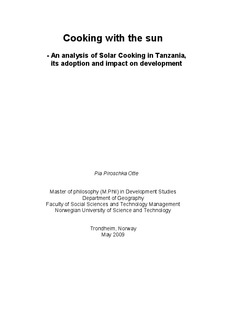| dc.description.abstract | This study aims to analyse solar cooking projects in Tanzania regarding their adoption and impact on development.
Biomass is a traditional source of energy in Tanzania which counts for 90 percent of the total energy use. The high use of biomass is claimed to have negative environmental, economic and health impacts. In this way, Solar Cooking seems to present an alternative solution since it does not require the use of firewood or charcoal, which prevents people from cutting trees, and particularly women from spending hours for fuelwood collection or even from spending money to buy it. In addition, Solar Cooking does not pollute the environment since it does not produce smoke. However, several studies showed that decades of efforts to implement and improve solar cookers for developing countries have not helped to achieve the breakthrough of this technology.
The specific objectives of this thesis are to find out which factors limit/enable the adoption of solar cookers, to investigate why people decide to use/ not this technology, and to find out in which way the use of Solar Cooking could be increased. In addition, the study investigates the ways in which Solar Cooking contributes to a development. The discussion of these objectives is based on the Capability Approach and the Innovation- Decision Model according to Rogers. The study focuses on three solar cooking projects in Tanzania.
I argue that Solar Cooking is adopted to a certain degree in Tanzania but that the wider success is influenced by different factors including economic affordability, technology, social/cultural values, sustainability, infrastructure, information and the area where the solar cooking projects takes place. In addition, the study shows that solar cooking leads to an improvement of women’s perception of their own health and a considerable time gain which is mainly used for income generating activities and domestic work.
Key words:
Solar Cooking, Capability Approach, Innovation Diffusion Theory, Energy, | nb_NO |
